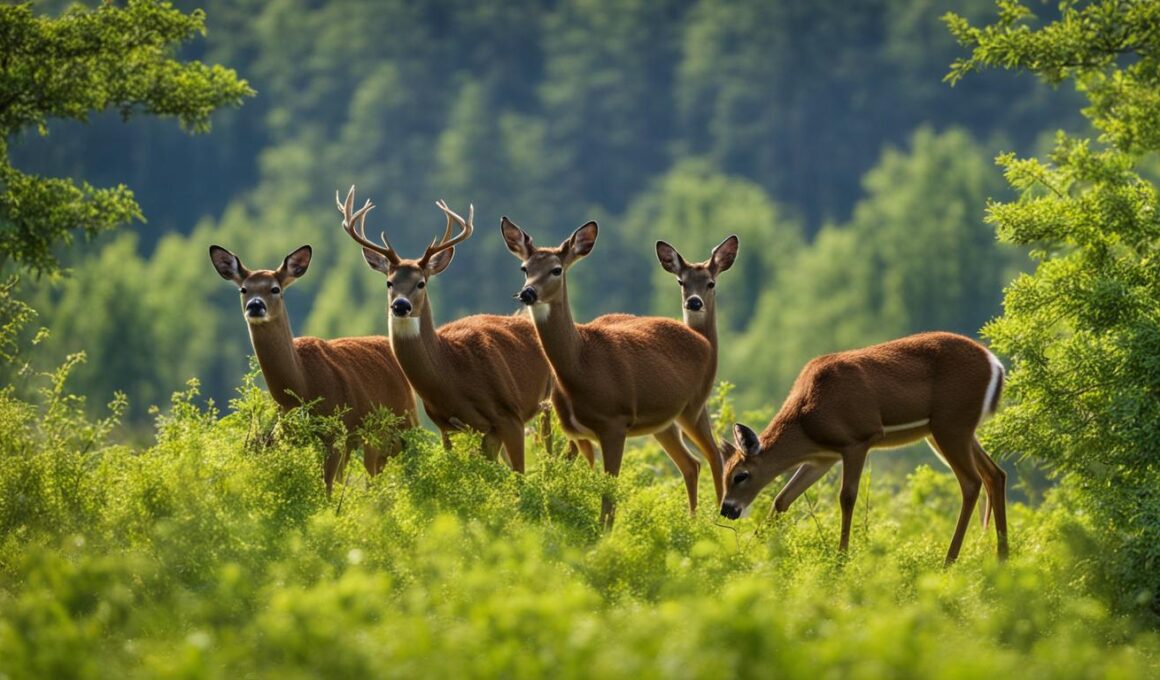Have you ever wondered if deer eat blueberries? Well, the answer is yes! Deer have a diverse feeding habit and blueberries are definitely on their menu. These wild creatures find blueberries not only delicious but also a great source of essential nutrients.
When it comes to blueberries, deer will consume all parts of the plant, including the fruits, twigs, stems, and leaves. This can pose a threat to blueberry plants and potentially ruin your anticipated harvest.
But don’t worry! There are ways you can protect your precious blueberry plants from deer damage. By implementing the right methods, you can enjoy a bountiful harvest while keeping deer at bay.
In the next sections, we will explore various strategies for protecting blueberry plants from deer. We’ll discuss deer repellents, scare tactics, individual protection measures, and different fencing options to keep these curious creatures away from your blueberries.
So, if you’re concerned about your beautiful blueberry plants becoming a deer’s favorite buffet, keep on reading to discover effective ways to safeguard your garden.
Protecting Blueberry Plants from Deer
When it comes to protecting your beloved blueberry plants from deer, there are several effective strategies you can implement. By employing the right combination of deer repellents, scare tactics, individual plant protection, and fencing options, you can safeguard your blueberries and enjoy a bountiful harvest.
Deer Repellents for Blueberries:
One way to deter deer from feasting on your blueberry plants is by using deer repellents specifically designed for edible plants. These repellents work by targeting the deer’s sense of smell and taste, making your blueberries unappetizing to them. It is advisable to rotate between different types of repellents to prevent deer from becoming accustomed to a particular scent. This variability keeps them on their toes and discourages their visits to the blueberry patch.
Scare Tactics for Deer:
Scare tactics can be another effective method to keep deer away from your blueberry plants. You can employ scarecrows or hang shiny objects near the blueberry patch to startle the deer and deter them from approaching. Motion-activated lights or sprinklers can also be useful in creating sudden movements and noises that scare deer away. By making your blueberry plants an unpredictable and intimidating environment, you can successfully keep deer at bay.
Individual Protection for Blueberry Plants:
To provide individual protection for your blueberry plants, you can encircle them with mesh or netting. Bird netting is well-suited for this purpose, as it offers effective defense while also allowing sunlight and rain to reach the plants. By forming a barrier that prevents deer from accessing the blueberries, you can preserve the fruits for yourself, ensuring a tasty harvest.
Fencing Options for Deer Prevention:
Installing a fence around your property is a reliable and long-term solution for keeping deer out of your garden. To effectively deter deer, the fence should be at least 8 feet in height and extend all the way to the ground, preventing deer from both jumping over or crawling under it. You have a variety of fencing options to choose from, including wires, electric fences, or wooden fences, depending on your personal preferences and budget.
By combining different methods such as deer repellents, scare tactics, individual protection measures, and fencing options, you can create a robust defense system that will protect your blueberry plants from the persistent munching of deer. When it comes to enjoying the fruits of your labor, a little extra effort to keep the deer at bay will go a long way.
Deer-Resistant Alternatives for Blueberries
If you’re looking to protect your blueberries from deer but still want to enjoy the beauty of these fruit-bearing plants, there are some deer-resistant blueberry varieties you can consider. While no plant is entirely deer-proof, certain varieties have shown more resistance to deer browsing.
One such variety is the blueberry elder, scientifically known as Sambucus Canadensis. This particular blueberry variety is less appealing to deer compared to other varieties. However, it’s important to note that hungry deer may still consume the fruits of the blueberry elder if no other food sources are available.
Please keep in mind that the blueberry elder is more suitable for larger gardens or open spaces as it can grow quite tall. If you have a smaller garden or prefer container gardening, it might be best to explore other options. Having realistic expectations about deer-resistant plants is crucial, and it’s important to implement additional protective measures even when using resistant varieties.
To give you a visual idea of the blueberry elder, take a look at the image below:
Conclusion
Protecting blueberry plants from deer is crucial to ensure a bountiful harvest. As we’ve discussed, deer are known to eat blueberries and can cause significant damage if left unchecked. By implementing effective methods for keeping deer away from blueberries, you can safeguard your plants and enjoy a successful harvest.
One of the key strategies is to use a combination of deterrents. Utilizing deer repellents specifically designed for edible plants can help discourage deer from feasting on blueberries. Rotate between different repellents to prevent deer from becoming accustomed to a particular scent.
In addition to repellents, scare tactics can be effective in deterring deer. Scarecrows, shiny objects, motion-activated lights, and sprinklers can startle deer and make them think twice about entering your blueberry patch. Individual protection measures, such as mesh or netting, can also prevent deer from accessing the plants without causing damage.
For a more comprehensive solution, consider installing a fence around your property. Choose a fence that is at least 8 feet high and reaches the ground to prevent deer from jumping or crawling under it. Wires, electric, or wooden fences can all be viable options based on your preference and budget.
Remember, no plant is entirely deer-proof, but by implementing these effective methods and considering deer-resistant varieties like the blueberry elder, you can significantly reduce the risk of deer damage. Protect your blueberry plants from deer and enjoy a thriving harvest season!










